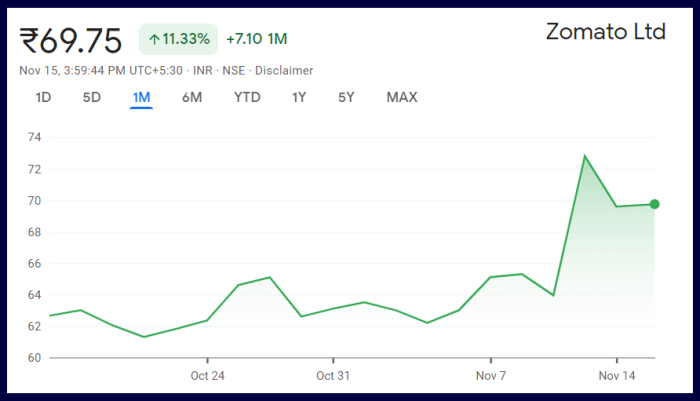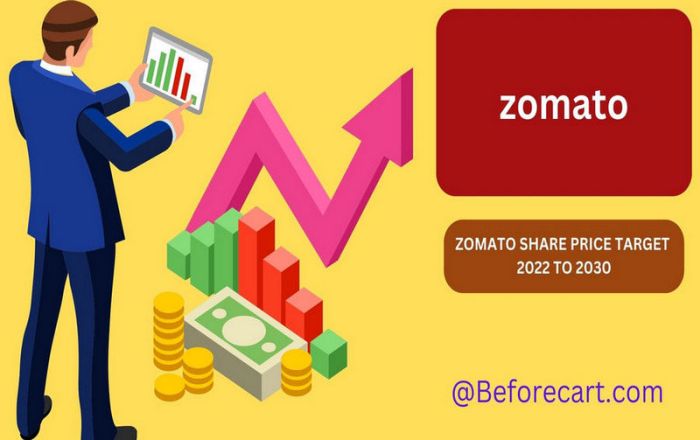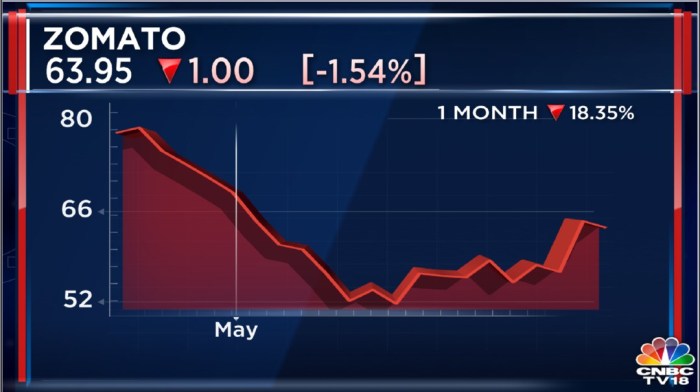Zomato share price has been on a roller coaster ride, reflecting the ups and downs of the online food delivery market. From its humble beginnings as a restaurant guide, Zomato has transformed into a global giant, connecting millions of hungry customers with their favorite eateries.
But the journey hasn’t been without its challenges, with competition heating up and investors constantly evaluating the company’s growth prospects.
This article delves into the factors that influence Zomato’s share price, exploring the company’s financial performance, growth strategies, and the broader industry landscape. We’ll also analyze investor sentiment and analyst recommendations to gain a comprehensive understanding of where Zomato might be headed.
Zomato Company Overview
Zomato, a global online food delivery platform, has revolutionized the way people order and experience food. Founded in 2008, the company has become a household name in India and several other countries. Its journey from a simple restaurant guide to a multi-faceted food tech giant is a testament to its innovative approach and relentless pursuit of customer satisfaction.
Zomato’s Founding and Mission
Zomato was founded in 2008 by Deepinder Goyal and Pankaj Chaddah. Their initial goal was to create a comprehensive online restaurant guide that would help users discover and explore dining options in their city. Zomato’s mission has evolved over time, encompassing a broader vision of connecting food lovers with restaurants and enabling a seamless food ordering experience.
Zomato’s Business Model and Revenue Generation
Zomato operates a multi-pronged business model that generates revenue from various sources. Its core business is online food delivery, where it connects customers with restaurants and charges a commission on each order. Zomato also earns revenue from advertising, subscriptions, and its other services, such as table reservations, food delivery, and grocery delivery.
Zomato’s share price has been on a rollercoaster ride lately, reflecting the volatile nature of the tech sector. While investors are closely watching Zomato’s performance, it’s important to remember that there are other businesses thriving, like dermatology associates of concord , which provides essential healthcare services.
Ultimately, Zomato’s share price will depend on a multitude of factors, including its ability to navigate the competitive food delivery market and execute its growth strategy effectively.
Zomato’s Key Markets and Competitive Landscape, Zomato share price
Zomato has a significant presence in India, where it holds a dominant market share in the food delivery sector. The company has also expanded its operations to several other countries, including the United States, Canada, Australia, and the United Kingdom.
Zomato faces intense competition from other players in the food delivery market, such as Swiggy in India and Uber Eats globally.
Factors Influencing Zomato Share Price
Zomato’s share price is influenced by a complex interplay of macroeconomic, industry-specific, and company-specific factors. Understanding these factors is crucial for investors seeking to make informed decisions about Zomato’s stock.
Macroeconomic Factors
Macroeconomic factors play a significant role in shaping the overall investment environment, including Zomato’s share price.
- Inflation:Rising inflation can erode consumer spending power, leading to a decline in demand for discretionary services like food delivery. This can negatively impact Zomato’s revenue growth and profitability, putting downward pressure on its share price.
- Interest Rates:Increased interest rates can make borrowing more expensive for businesses, including Zomato. This can hinder its expansion plans and investment in new technologies, potentially affecting its long-term growth prospects and share price.
- Economic Growth:A robust economy generally translates into higher consumer spending, benefiting companies like Zomato. Conversely, economic downturns can lead to reduced consumer spending, impacting Zomato’s revenue and share price.
Industry-Specific Factors
Zomato operates in a dynamic and competitive industry, making its share price susceptible to industry-specific trends.
- Growth of the Online Food Delivery Market:The online food delivery market is experiencing rapid growth, driven by factors like increasing urbanization, busy lifestyles, and the convenience of ordering food online. This growth presents opportunities for Zomato to expand its market share and generate higher revenue, potentially boosting its share price.
- Competition:Zomato faces intense competition from other players in the online food delivery market, such as Swiggy in India and Uber Eats globally. Competitive pressures can impact Zomato’s pricing strategies, marketing efforts, and overall profitability, influencing its share price.
Zomato’s Financial Performance
Zomato’s financial performance is a key driver of its share price. Investors closely monitor metrics such as revenue growth, profitability, and cash flow to assess the company’s financial health and future prospects.
- Revenue Growth:Strong revenue growth indicates that Zomato is successfully expanding its business and capturing market share. This can lead to investor confidence and a rise in its share price.
- Profitability:Zomato’s profitability is crucial for long-term sustainability and investor returns. A profitable business is more likely to attract investors and see its share price appreciate.
- Cash Flow:Positive cash flow indicates that Zomato is generating sufficient cash to fund its operations and invest in future growth. Strong cash flow can enhance investor confidence and support a higher share price.
Recent Developments and News Affecting Zomato

Zomato, India’s leading food delivery and restaurant aggregator platform, has been making significant strides in recent times, with a series of developments and news announcements that have a direct impact on its share price performance. These developments range from strategic partnerships and product launches to regulatory changes and industry trends.
Understanding these recent events is crucial for investors looking to assess Zomato’s future prospects and potential for growth.
New Partnerships and Acquisitions
Zomato has been actively forging strategic partnerships and acquisitions to expand its reach and enhance its offerings. These partnerships and acquisitions are aimed at strengthening its core business, diversifying its revenue streams, and exploring new growth avenues.
- In March 2023, Zomato announced a partnership with Swiggy, its primary competitor, to create a joint delivery network. This collaboration aimed to optimize delivery operations, reduce costs, and improve efficiency for both companies. The impact of this partnership on Zomato’s share price was positive, as investors saw it as a move towards consolidation and a potential for cost savings.
The partnership, however, faced scrutiny from the Competition Commission of India (CCI), raising concerns about potential market dominance.
- Zomato also acquired a majority stake in Shiprocket, a leading logistics platform, in April 2023. This acquisition aimed to bolster Zomato’s logistics capabilities and enhance its delivery network. The move was seen as a strategic investment to strengthen its supply chain and improve delivery times.
The acquisition was well-received by investors, as it positioned Zomato as a leading player in the logistics space.
Product Launches and Innovations
Zomato has been actively innovating and launching new products and features to enhance user experience and expand its offerings. These innovations are aimed at attracting new customers, increasing user engagement, and driving revenue growth.
- Zomato introduced Zomato Instant, a quick commerce service, in early 2023. This service aimed to provide customers with faster delivery times for essential items, leveraging its existing delivery network. The launch of Zomato Instant was met with positive investor sentiment, as it presented a potential new growth avenue and a way to compete with other quick commerce players like Blinkit and Dunzo.
- Zomato also launched Zomato Gold, a premium subscription service, in 2023. This service offered members exclusive discounts and benefits at participating restaurants. The launch of Zomato Gold was seen as a move to enhance customer loyalty and generate recurring revenue.
Investors were generally positive about the launch, as it provided Zomato with a new revenue stream and a way to differentiate itself from competitors.
Zomato’s Growth Strategies and Future Prospects

Zomato, a leading food delivery and restaurant aggregator platform, is on a mission to become the go-to destination for all things food. With its expansive reach and diverse offerings, Zomato has carved a significant niche in the global food tech industry.
The company’s growth trajectory hinges on a multi-pronged strategy that encompasses expansion into new markets, product innovation, and customer acquisition. This section delves into Zomato’s key growth strategies and explores the potential challenges and opportunities that lie ahead.
Zomato’s Expansion Strategies
Zomato’s expansion strategy is predicated on its ability to tap into new markets and replicate its success in existing ones. The company has consistently pursued a strategy of geographical expansion, adding new cities and countries to its network. This expansion has been driven by a combination of factors, including:
- Growing demand for food delivery services:The global food delivery market is experiencing exponential growth, driven by factors such as urbanization, busy lifestyles, and the increasing popularity of online ordering. Zomato is well-positioned to capitalize on this trend by expanding into new markets with high growth potential.
- Strategic partnerships:Zomato has forged strategic partnerships with local players in new markets to accelerate its expansion. These partnerships provide access to local expertise, infrastructure, and customer base, enabling Zomato to quickly establish a presence in new territories.
- Leveraging technology:Zomato leverages technology to streamline its operations and optimize its expansion efforts. The company’s proprietary technology platform enables efficient order processing, delivery management, and customer engagement, facilitating rapid expansion into new markets.
Zomato’s Product Innovation
Zomato is constantly innovating its product offerings to cater to the evolving needs of its customers. The company’s product innovation strategy focuses on:
- Expanding its product portfolio:Zomato has expanded its product portfolio beyond food delivery to include services such as table reservations, restaurant reviews, and food ordering. This diversification allows Zomato to cater to a wider customer base and generate multiple revenue streams.
- Enhancing the customer experience:Zomato is continuously enhancing its user interface, delivery speed, and payment options to provide a seamless and convenient experience for its customers. The company is also investing in artificial intelligence (AI) and machine learning (ML) technologies to personalize recommendations and improve customer satisfaction.
- Developing new features:Zomato is constantly developing new features to enhance its platform and differentiate itself from competitors. For example, the company has introduced features such as real-time order tracking, live restaurant wait times, and loyalty programs.
Zomato’s Customer Acquisition Strategies
Zomato’s customer acquisition strategy is focused on attracting new users and retaining existing ones. The company employs a multi-faceted approach that includes:
- Aggressive marketing campaigns:Zomato invests heavily in marketing campaigns to raise brand awareness and attract new customers. These campaigns utilize a mix of digital and traditional channels, including social media, search engine optimization (), and television advertising.
- Attractive promotions and discounts:Zomato offers attractive promotions and discounts to incentivize new customers to try its services. These promotions can include free delivery, discounted meals, and loyalty program rewards.
- Building a strong brand reputation:Zomato focuses on building a strong brand reputation by providing high-quality services and maintaining a positive customer experience. The company also leverages user-generated content, such as reviews and ratings, to enhance its brand image.
Challenges and Opportunities Facing Zomato
Zomato, like any other business, faces a number of challenges and opportunities. The company’s success in the future will depend on its ability to navigate these challenges and capitalize on the opportunities that arise.
- Competition:The food delivery market is highly competitive, with established players such as Uber Eats, DoorDash, and Deliveroo vying for market share. Zomato must continue to innovate and differentiate itself to stay ahead of the competition.
- Regulation:The food delivery industry is subject to a range of regulations, including those related to food safety, labor standards, and consumer protection. Zomato must comply with these regulations to operate effectively and maintain a positive public image.
- Profitability:Zomato has struggled to achieve profitability, due to factors such as high operating costs and fierce competition. The company must find ways to optimize its operations and generate sustainable revenue streams to achieve profitability.
- Technological advancements:The food delivery industry is constantly evolving, with new technologies emerging all the time. Zomato must stay abreast of these advancements and invest in new technologies to maintain its competitive edge.
- Expansion into new markets:Expanding into new markets can be challenging, as Zomato must adapt its operations to local conditions and regulations. The company must also overcome cultural differences and build trust with local customers.
Zomato’s Long-Term Outlook
The long-term outlook for Zomato’s share price is tied to its growth prospects and the overall industry trends. The company’s strong growth strategy, coupled with the increasing demand for food delivery services, suggests a positive outlook for Zomato’s future. However, the company’s ability to navigate the challenges and capitalize on the opportunities ahead will be crucial to its long-term success.
Investor Sentiment and Analyst Recommendations: Zomato Share Price

Investor sentiment towards Zomato has been mixed, reflecting the company’s growth trajectory and the challenges it faces in a competitive market. While some investors are optimistic about Zomato’s long-term prospects, others are concerned about its profitability and the sustainability of its growth.
Analyst Recommendations
Analyst recommendations provide insights into the market’s overall view of Zomato’s stock. Here’s a summary of some key recommendations:
“Zomato’s recent performance has been encouraging, and we believe the company is well-positioned to capitalize on the growth of the online food delivery market in India. We maintain our ‘Buy’ rating on the stock with a price target of ₹100.”
Morgan Stanley
“Zomato’s path to profitability remains uncertain, and we are concerned about the company’s high valuation. We maintain our ‘Hold’ rating on the stock with a price target of ₹75.”
Goldman Sachs
“Zomato’s focus on expanding its ecosystem and exploring new revenue streams is positive. We maintain our ‘Outperform’ rating on the stock with a price target of ₹90.”
Citigroup
These recommendations highlight the diverse perspectives on Zomato’s future. Analysts are generally positive about the company’s growth potential, but there are concerns about profitability and valuation. The factors driving these recommendations include:* Recent Financial Performance:Zomato’s recent financial performance has been mixed, with some quarters showing improvement in profitability, while others have seen losses.
Analysts are closely watching the company’s ability to control costs and generate consistent profits.
Growth Prospects
Zomato operates in a rapidly growing market, and analysts are optimistic about the company’s ability to capture market share and expand its services. However, concerns remain about the intensity of competition in the online food delivery space.
Competitive Landscape
Zomato faces strong competition from other players in the online food delivery market, such as Swiggy and Uber Eats. Analysts are assessing the company’s competitive advantages and its ability to maintain its market share in the face of competition.
Final Summary
Ultimately, Zomato’s share price hinges on its ability to navigate the evolving food delivery market, maintain its competitive edge, and continue to deliver value to its customers and investors. As the company expands into new markets and explores innovative solutions, its future prospects remain bright, but the path ahead is likely to be filled with both opportunities and challenges.